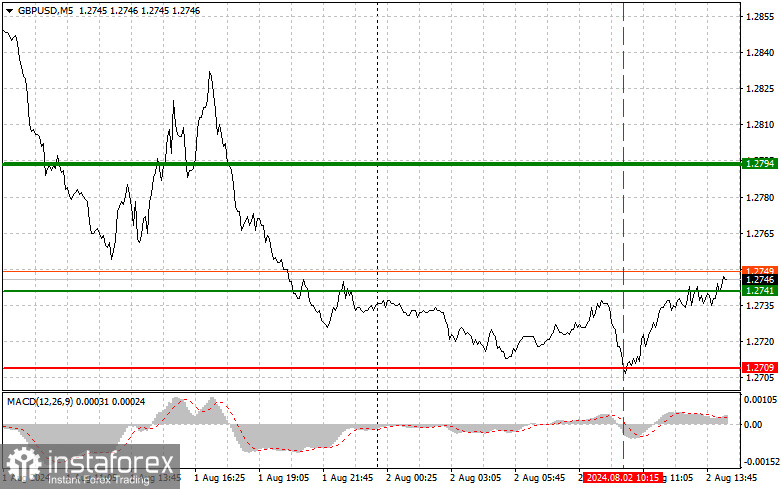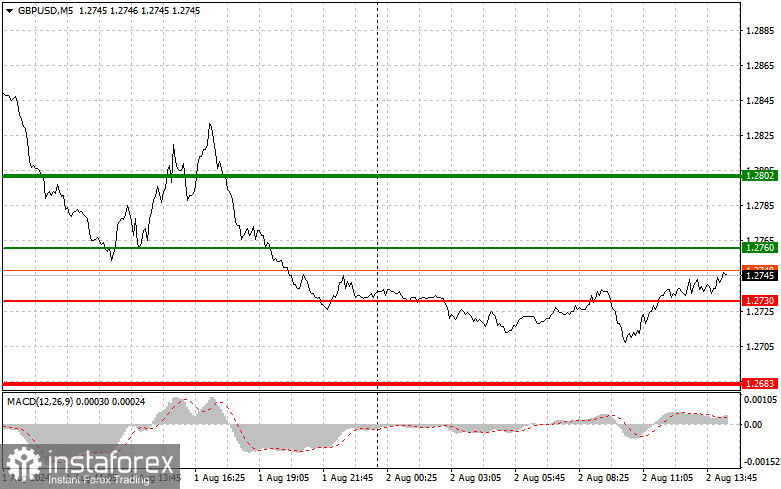Analysis of Trades and Tips for Trading the British Pound
The price test at 1.2709 occurred when the MACD indicator had moved significantly downward from the zero mark, limiting the further downward potential of the pound. Therefore, I decided not to sell at the lows, fearing a market reversal in the second half of the day. Indeed, there will be quite a few reasons for this, as data on the unemployment level and changes in the number of employed in the U.S. non-agricultural sector may change the market dynamics. Economists expect weak statistics, which will lead to a rise in the pound at the end of the week, anticipating a correction after yesterday's significant drop due to the Bank of England's interest rate cut. Regarding the intraday strategy, I plan to act based on the implementation of scenario No. 1, even disregarding the MACD indicator readings, as I expect strong and directed movements.

Buy Signal
Scenario #1: Today, I plan to buy the pound when the entry point reaches the area of 1.2760 (green line on the chart) with a target of rising to the level of 1.2802 (thicker green line on the chart). At the 1.2802 area, I will exit the buys and open sales in the opposite direction (calculation of a movement of 30-35 points in the opposite direction from the level). A rise in the pound can be expected following weak U.S. statistics today. Important, before buying, make sure that the MACD indicator is above the zero mark and beginning to rise.
Scenario #2: I also plan to buy the pound today in case of two consecutive tests of the price at 1.2730 when the MACD indicator is in the oversold area. This will limit the downward potential of the pair and lead to a market reversal upwards. A rise to the opposite levels of 1.2760 and 1.2802 can be expected.
Sell Signal
Scenario #1: I plan to sell the pound today after updating the level of 1.2730 (red line on the chart), which will lead to a quick decline in the pair. The key target for sellers will be the level of 1.2683, where I will exit the sales and also immediately open buys in the opposite direction (calculation of a movement of 20-25 points in the opposite direction from the level). Sellers will show themselves only after strong U.S. data. Important, before selling, make sure that the MACD indicator is below the zero mark and beginning to decline.
Scenario #2: I also plan to sell the pound today in case of two consecutive tests of the price at 1.2760 when the MACD indicator is in the overbought area. This will limit the upward potential of the pair and lead to a downward market reversal. A decline to the opposite levels of 1.2730 and 1.2683 can be expected.

What's on the Chart:
- Thin green line: Entry price for buying the trading instrument.
- Thick green line: Presumed price where you can set Take Profit or independently secure profits, as further growth above this level is unlikely.
- Thin red line: Entry price for selling the trading instrument.
- Thick red line: Presumed price where you can set Take Profit or independently secure profits, as further decline below this level is unlikely.
- MACD Indicator: It's important to be guided by overbought and oversold zones when entering the market.
Important: For beginners in the Forex market, it is crucial to be very cautious when making market entry decisions. It's best to stay out of the market before the release of important fundamental reports to avoid sharp fluctuations in exchange rates. If you decide to trade during news releases, always set stop orders to minimize losses. You need to place stop orders to avoid losing your entire deposit, especially if you do not use money management and trade large volumes.
Remember: For successful trading, you must have a clear trading plan, like the one I have presented above. Making spontaneous trading decisions based on the current market situation is initially a losing strategy for an intraday trader.
 English
English 
 Русский
Русский Bahasa Indonesia
Bahasa Indonesia Bahasa Malay
Bahasa Malay ไทย
ไทย Español
Español Deutsch
Deutsch Български
Български Français
Français Tiếng Việt
Tiếng Việt 中文
中文 বাংলা
বাংলা हिन्दी
हिन्दी Čeština
Čeština Українська
Українська Română
Română

